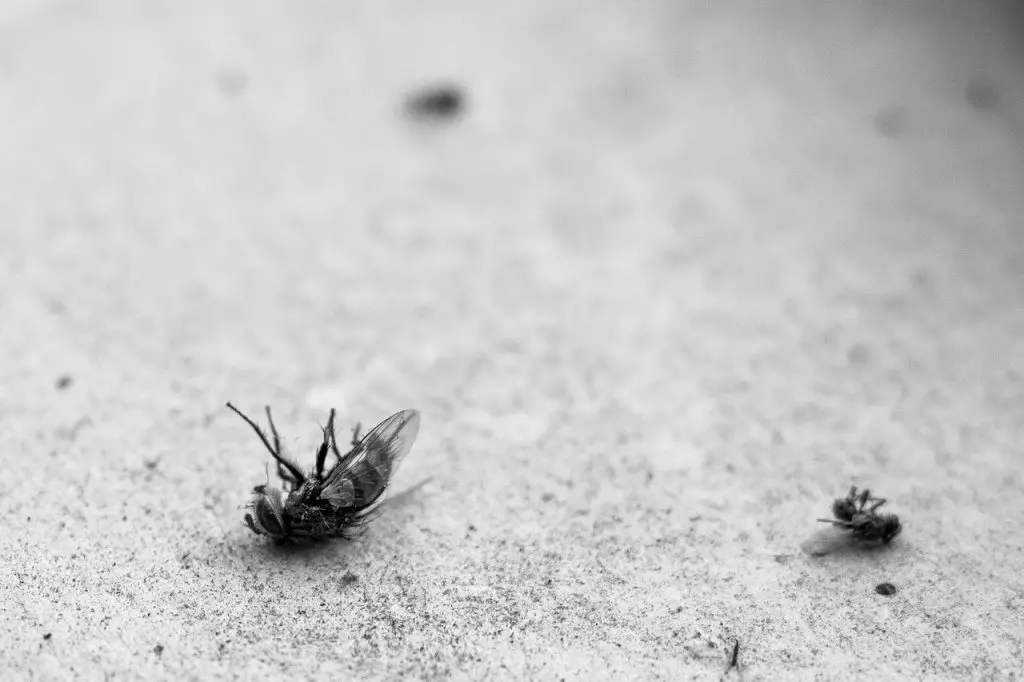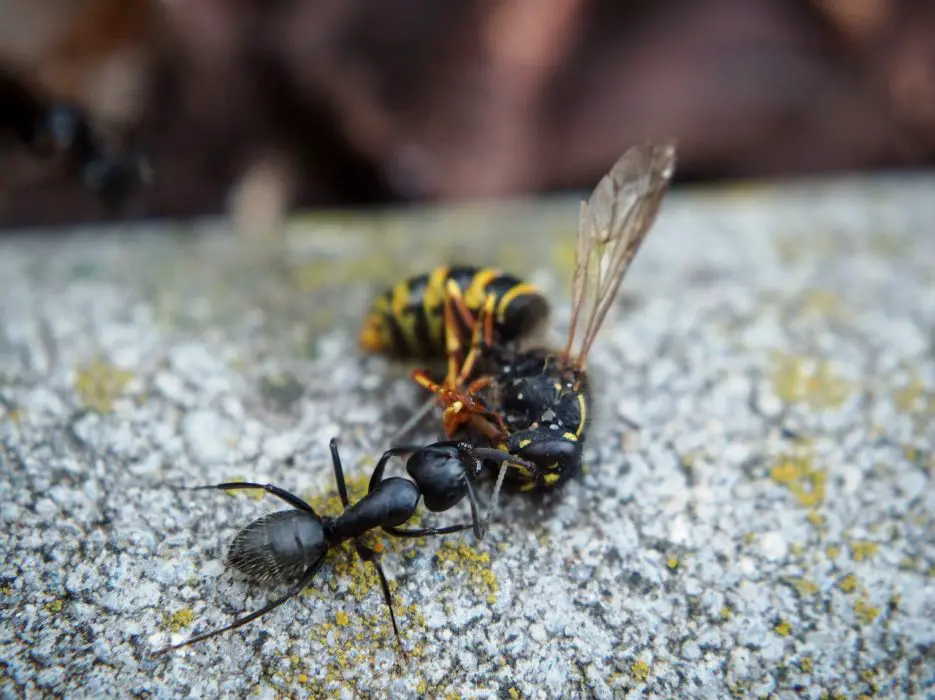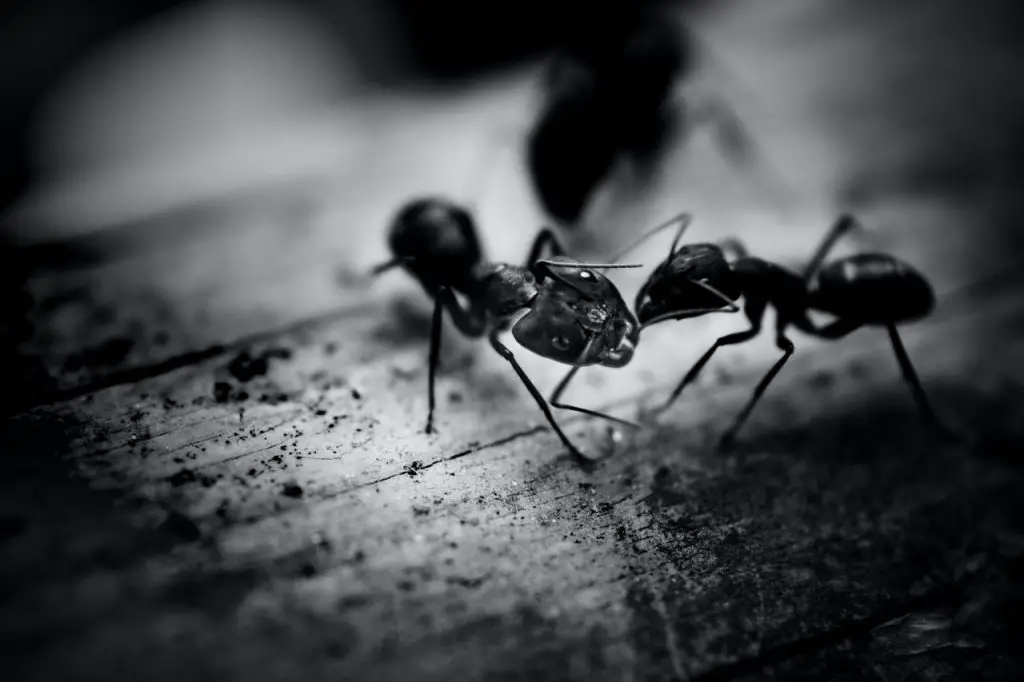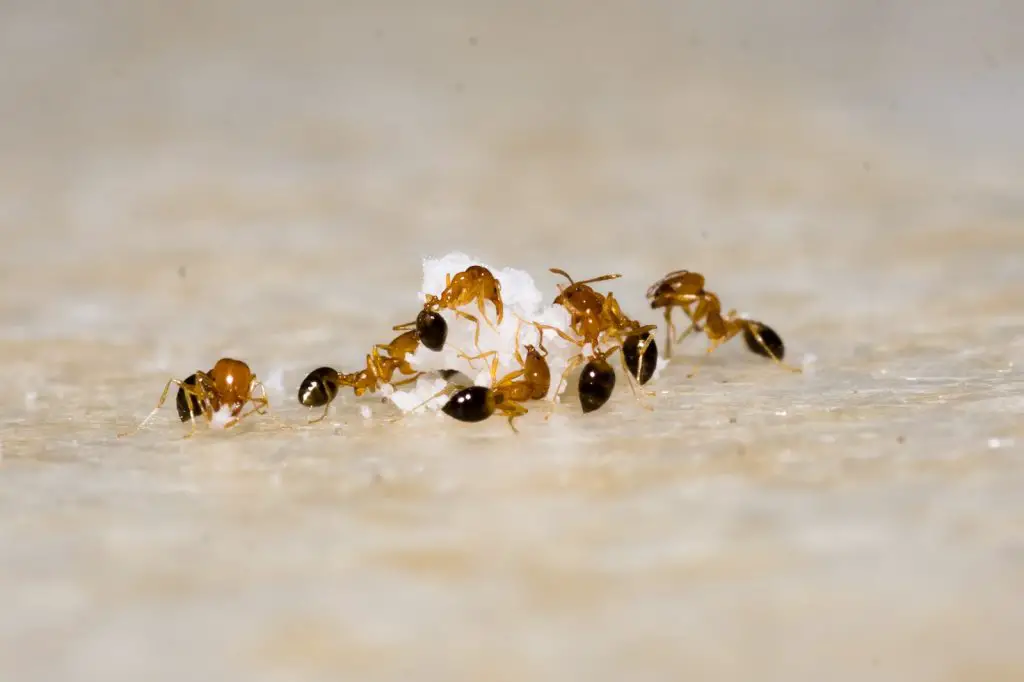Do you think of ants as cute, industrious little creatures? Well, prepare to have your mind blown.
Ants have a diverse diet as they are omnivorous creatures.
Ants are not only active insects but also have a strong desire to consume anything that’s not alive, including dead animals.
Join me as we dive deep into the world of ants and discover the shocking truth about their eating habits. and find out, do ants eat dead animals?
Do Ants Eat Dead Animals? From Scavengers to Soldiers
Some species of ants do eat dead animals.
These types of ants are known as scavengers and play an important role in breaking down organic matter and recycling nutrients into the ecosystem.
Ants, like many other creatures, have a varied diet. Their omnivorous nature reveals that they actively consume both plant and animal matter.
In terms of the latter, ants do indeed consume dead animals, such as insects and even small mammals.
One reason ants eat dead animals is for the protein they provide.
This nutrient is essential for the ants’ survival, and they obtain it from a variety of sources, including dead animals. By consuming these carcasses, ants can supplement their diet and ensure they get the protein they need.
In addition to eating dead animals, ants also have a unique way of dealing with them. When an ant discovers a dead animal, it will often bring it back to the colony.
Following that, the remaining ants assume responsibility as they dissect the carcass and transport the individual pieces for consumption.
How Do Ants Find Dead Animals?
If you’re curious about how ants locate dead animals, you’ve come to the right place.
Firstly, ants have an incredible sense of smell that allows them to detect the presence of dead animals from a distance. They use their antennae to pick up chemical signals called pheromones. Which are emitted by the decaying flesh of the dead animal.
Once an ant has detected the scent of a dead animal. It will follow the trail of pheromones back to the source. As more ants catch wind of the scent. They will follow the trail, creating a line of ants leading to the carcass.
Another way ants locate dead animals is through their keen eyesight. Certain ants, like army ants, possess remarkable skills in hunting and capturing sizable prey, encompassing insects and even small mammals.
These ants have large compound eyes that allow them to see prey from a distance and coordinate their attack.
Lastly, ants may stumble upon a dead animal by chance while foraging for food. Once they discover the remains, they will communicate their location to the rest of the colony. Allowing other ants to come and help dissect and carry away the pieces.
Do Ants Eat Dead Ants?
Ants actively maintain a diverse diet, encompassing both plant and animal matter. When it comes to consuming other ants. Some ants do eat dead ants. In fact, it’s not uncommon for ants to feed on their deceased colony members.
Ants eat their own dead ants when there is a shortage of food.
Another reason ants eat dead ants is for the valuable protein they provide. As we mentioned earlier, ants require protein to survive, and dead ants can be a convenient and easily accessible source.
Interestingly, some species of ants may actively hunt and kill other species of ants, even those from a different colony, to satisfy their protein needs.

Do Ants Eat Dead Human Bodies?
Under certain circumstances, ants can and will consume human remains.
For example, if a person has died in a remote or natural setting, ants come across the body and begin to scavenge it for nutrients.
Furthermore, if a body lacks proper burial or storage, it may attract ants. It is important to note that ants are generally not regarded as primary consumers of human remains in forensic investigations. As other animals and insects tend to be more significant in decomposition processes.
In fact, ants actively join the ranks of the first insects to arrive at a decomposing body, playing a vital role in the process of decomposition.
However, it is essential to note that not all ant species actively consume human remains, and environmental conditions also contribute to the attraction of ants to a dead body.
Ants typically feed on soft tissues like muscle and fat, and they can also consume bone material. However, they are not able to consume harder materials like teeth or bone fragments.
Do Ants Mourn Death? Exploring Their Rituals Around Death
Ants are social insects that live in highly organized colonies, and their behavior is often fascinating and complex.
There is evidence to suggest that ants do exhibit behaviors that could be interpreted as mourning.
For example, when an ant dies, other ants in the colony will often gather around the body and engage in what is known as “funeral behavior.”
During funeral behavior, ants will surround the body of the dead ant and touch it with their antennae.
This behavior is believed to aid the ants in recognizing the scent of the deceased ant and potentially discerning the cause of death.
Ants also carry the body of the dead and away from the colony to prevent the spread of disease.
Additionally, studies have shown that ants may also exhibit changes in behavior after the death of a colony member.
For example, some species of ants may become more aggressive or territorial after the loss of a colony member.
Do Ants Eat Their Dead Queen? The Dreadful Reality of These Tiny Creatures
When ants cannot find enough food, they eat their dead queen to get the nutrients they need to survive.
They also eat their queen ant as a last resort when there’s nothing else to eat.
In most cases, the queen is highly valued and respected by the colony, and her death would be a significant loss.
Where Do Ants Carry Their Dead?
Ants have an intricate system for dealing with their dead.
When an ant dies, other ants in the colony will pick up the body and carry it to a designated area, typically away from the main living quarters.
This area is known as the ant graveyard and it serves as a place for the colony to deposit their dead and keep them separate from the living areas.
The dead ants are often disposed of in a pile or buried underground, depending on the species of ant.
Ants take the deceased fellow to the graveyard for a few reasons
- Firstly, it’s a hygienic practice that prevents the buildup of harmful bacteria and fungi that can occur from leaving dead ants lying around.
- Secondly, it helps to prevent the spread of disease and infections within the colony.
- Finally, it’s a way for the ants to honor their dead and show respect for their fallen comrades.
The ant graveyard serves as a reminder of the ants’ social nature and their strong sense of community.
Also, read: why do ants carry dead ants
Ants Carrying Injured: Unraveling Their Behavior
Ants have a unique way of dealing with injured ants. When an ant is injured, other ants will often carry it back to the colony where it will be taken care of.
The injured ant may receive treatment from other ants, such as being cleaned or having its wounds tended to.
In some cases, the injured ant nursed back to health and continue to contribute to the colony. However, if the injury is too severe, the ant may be sacrificed for the greater good of the colony.
This selfless behavior highlights the strong social bonds that exist within ant colonies and emphasizes the importance of cooperation and teamwork in their survival.
Can Ants Eat Live Animals?
Yes, some species of ants are known to be predators and will hunt and consume live animals for food. These ants have powerful mandibles that can crush and subdue their prey.
However, not all ants are predators, and some species solely rely on plant-based food sources.
Ants are known to eat a variety of live animals, including other insects, spiders, and even small vertebrates like lizards and frogs.
Some species of ants are specialized predators and have adapted to hunt and kill specific types of prey. While others opportunistically consume whatever comes their way.
Why Do Ants Carry Dead Ants?
Ants carry dead ants to a designated area, often called a graveyard, to prevent the spread of disease and maintain the cleanliness of their colony.
Additionally, the decomposition of the dead ant provides a source of nutrients for the colony.
Another reason is to use the dead ant’s body as a source of food, as ants are omnivorous and will consume dead animals.
Additionally, carrying dead ants away from the colony can help maintain the cleanliness and hygiene of the nest.
Conclusion
The blog delves into the intriguing question: “Do ants eat dead animals?” We embarked on a quest for the answer.
In conclusion, ants have a diverse diet that includes both plant and animal matter.
Certain ant species actively consume deceased animals, including insects, small mammals, and, under specific circumstances, even human remains.
Ants use their keen sense of smell and eyesight to locate dead animals, and once found. They may bring them back to the colony for the other ants to dissect and carry away for consumption.
Ants may also eat their own dead ants when there is a shortage of food. And compelling evidence suggests that ants demonstrate behaviors that can be interpreted as mourning.
Such as engaging in “funeral behavior”, When an ant dies.
Overall, ants play an important role in breaking down organic matter and recycling nutrients back into the ecosystem. Highlighting the intricate and complex nature of these fascinating insects.



